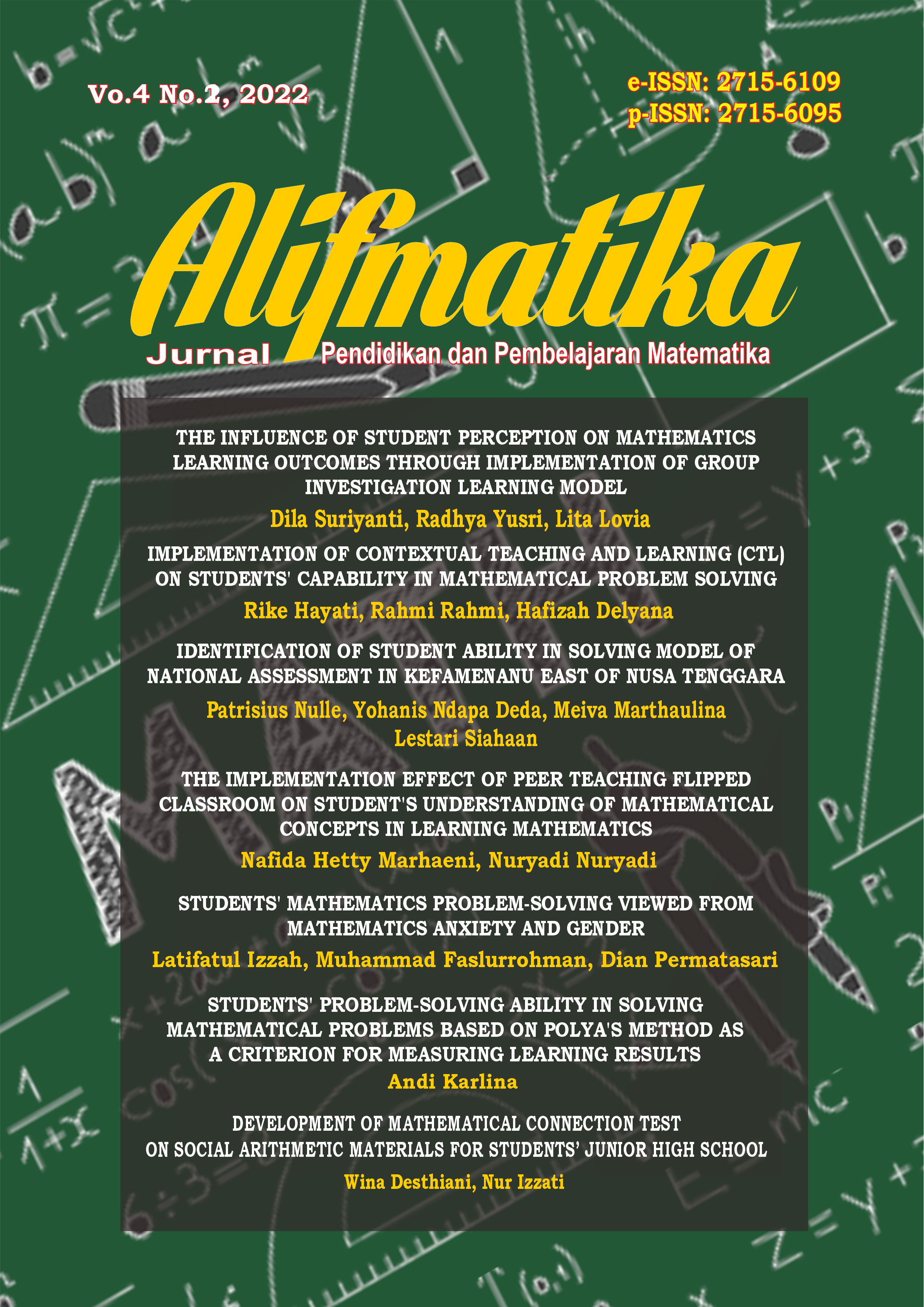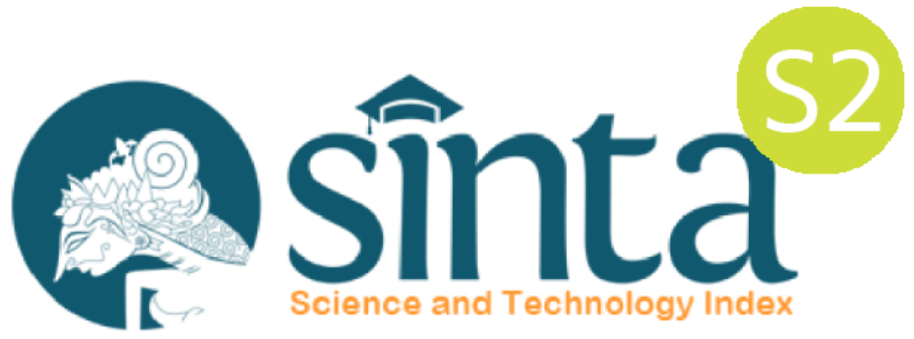THE IMPLEMENTATION EFFECT OF PEER TEACHING FLIPPED CLASSROOM ON STUDENT'S UNDERSTANDING OF MATHEMATICAL CONCEPTS IN LEARNING MATHEMATICS
DOI:
https://doi.org/10.35316/alifmatika.2022.v4i2.150-165Keywords:
Peer-teaching, flipped classroom, mathematical concepts, learning mathematicsAbstract
This research is motivated by the low understanding of students' mathematical concepts in the mathematics learning process. The purpose of this study was to find out how the influence of the Peer Teaching Flipped Classroom learning model on mathematical concept understanding, and the influence of Peer Teaching Flipped Classroom in terms of academic ability level on the student’s mathematical concept understanding ability in class XII IPA3 SMAN 1 X Koto Tanah Datar Regency. This type of research is a quantitative nonequivalent pretest-posttest experiment. Where the research subjects were students of class XII IPA SMAN 1 X Koto Kab. Tanah Datar for the 2022/2023 academic year, totaling 44 students. The instrument used to collect data is in the form of test questions. The results of this study indicate that students have an increase in answering questions. Based on data analysis obtained F(1.42) and p=0.001 <0.05 then H0 is rejected, which means that there is an influence of Peer Teaching Flipped Classroom on understanding mathematical concepts of class XII IPA3 students of SMAN 1 X Koto Kab. Tanah Datar. However, the level of students' academic ability did not have a significant effect on understanding mathematical concepts with the application of Peer Teaching Flipped Classroom. It is seen from the analysis of the data obtained p = 0.051> 0.05, then H0 is accepted.
Downloads
References
Bartell, T. G., Webel, C., Bowen, B., & Dyson, N. (2013). Prospective teacher learning: recognizing evidence of conceptual understanding. Journal of Mathematics Teacher Education, 16(1), 57–79. https://doi.org/10.1007/s10857-012-9205-4
Boud, D., & Molloy, E. (2013). Rethinking models of feedback for learning: the challenge of design. Assessment & Evaluation in Higher Education, 38(6), 698–712. https://doi.org/10.1080/02602938.2012.691462
Buchori, A., & Setyawati, R. D. (2015). Development learning model of charactereducation through e-comic in elementary school. International Journal of Education and Research, 3(9), 369–386. https://www.ijern.com/journal/2015/September-2015/30.pdf
Coetzee, S., & Merwe, P. van der. (2010). Industrial psychology students’ attitudes towards statistics. SA Journal of Industrial Psychology, 36(1), 1–8. http://www.scielo.org.za/scielo.php?script=sci_arttext&pid=S2071-07632010000100009
Davis, J. (2014). The mathematical experiences of Black males in a predominantly Black urban middle school and community. International Journal of Education in Mathematics, Science and Technology, 2(3). https://www.ijemst.org/index.php/ijemst/article/view/40
Dianawati, H. (2015). Pengaruh Penerapan Metode Peer Teaching dalam Pembelajaran Matematika Terhadap Peningkatan Prestasi Belajar Siswa Kelas VI Sekolah Dasar Negeri Giring Ikecamatan Manding Kabupaten Sumenep. Jurnal Ilmiah MITSU, 3(1), 27–38. https://doi.org/10.24929/ft.v3i1.139
Leppink, J. (2018). Analysis of covariance (ANCOVA) vs. moderated regression (MODREG): Why the interaction matters. Health Professions Education, 4(3), 225–232. https://doi.org/10.1016/j.hpe.2018.04.001
Nurlaily, V. A., Soegiyanto, H., & Usodo, B. (2019). Elementary School Teachers’ Obstacles in the Implementation of Problem-Based Learning Model in Mathematics Learning. Journal on Mathematics Education, 10(2), 229–238. https://doi.org/10.22342/jme.10.2.5386.229-238
Ponidi, P., Waziana, W., Kristina, M., & Gumanti, M. (2020). Model of Utilizing Discovery Learning to Improve Mathematical Learning Achievements. Attractive: Innovative Education Journal, 2(1), 41–48. https://doi.org/10.51278/aj.v2i1.27
Radiusman, R. (2020). Studi Literasi: Pemahaman Konsep Anak Pada Pembelajaran Matematika. FIBONACCI: Jurnal Pendidikan Matematika Dan Matematika, 6(1), 1–8. https://doi.org/10.24853/fbc.6.1.1-8
Ramadoni, R., & Mustofa, M. (2022). Enhancing flipped classroom with peer teaching to promote students’ conceptual understanding and self-efficacy in calculus courses. Pegem Journal of Education and Instruction, 12(3), 154–168. https://doi.org/10.47750/pegegog.12.03.17
Riccomini, P. J., Smith, G. W., Hughes, E. M., & Fries, K. M. (2015). The language of mathematics: The importance of teaching and learning mathematical vocabulary. Reading & Writing Quarterly, 31(3), 235–252. https://doi.org/10.1080/10573569.2015.1030995
Siagan, M. V, Saragih, S., & Sinaga, B. (2019). Development of Learning Materials Oriented on Problem-Based Learning Model to Improve Students’ Mathematical Problem Solving Ability and Metacognition Ability. International Electronic Journal of Mathematics Education, 14(2), 331–340. https://www.iejme.com/article/development-of-learning-materials-oriented-on-problem-based-learning-model-to-improve-students-5717
Simamora, R. E., & Saragih, S. (2019). Improving Students’ Mathematical Problem Solving Ability and Self-Efficacy through Guided Discovery Learning in Local Culture Context. International Electronic Journal of Mathematics Education, 14(1), 61–72. https://www.iejme.com/article/improving-students-mathematical-problem-solving-ability-and-self-efficacy-through-guided-discovery-3966
Supardi, S. U. S. (2015). Hasil belajar matematika siswa ditinjau dari interaksi tes formatif uraian dan kecerdasan emosional. Formatif: Jurnal Ilmiah Pendidikan MIPA, 3(2). https://doi.org/10.30998/formatif.v3i2.115
Widodo, S. A. (2018). Selection of Learning Media Mathematics for Junior School Students. Turkish Online Journal of Educational Technology-TOJET, 17(1), 154–160. http://www.tojet.net/volumes/v17i1.pdf#page=164
Widodo, S., Irfan, M., Leonard, L., Fitriyani, H., Perbowo, K., & Trisniawati, T. (2019). Visual media in team accelerated instruction to improve mathematical problem-solving skill. Proceedings of the 1st International Conference on Science and Technology for an Internet of Things, 20 October 2018, Yogyakarta, Indonesia. https://doi.org/10.4108/eai.19-10-2018.2281297
Wijaya, T. T., Ying, Z., Chotimah, S., & Bernard, M. (2020). Hawgent dynamic mathematic software as mathematics learning media for teaching quadratic functions. Journal of Physics: Conference Series, 1592(1), 12079. https://doi.org/10.1088/1742-6596/1592/1/012079
Xiu, Y., Moore, M. E., Thompson, P., & French, D. P. (2019). Student perceptions of lecture-capture video to facilitate learning in a flipped classroom. TechTrends, 63(4), 369–375. https://doi.org/10.1007/s11528-018-0293-6
Yuliani, E. N., Zulfah, Z., & Zulhendri, Z. (2018). Kemampuan Pemahaman Konsep Matematis Siswa Kelas Viii Smpn 1 Kuok Melalui Model Pembelajaran. Jurnal Cendekia: Jurnal Pendidikan Matematika, 2(2), 91–100. https://doi.org/10.31004/cendekia.v2i2.51
Yunus, J., Zaura, B., & Yuhasriati, Y. (2019). Analysis of Students Error According to Newman in Solving Mathematics Problems of Algebra in The Form of Story in Second Grade of SMPN 1 Banda Aceh. Jurnal Geuthèë: Penelitian Multidisiplin, 2(2), 308–313. https://doi.org/10.52626/jg.v2i2.63
Zou, D., & Xie, H. (2019). Flipping an English writing class with technology-enhanced just-in-time teaching and peer instruction. Interactive Learning Environments, 27(8), 1127–1142. https://doi.org/10.1080/10494820.2018.1495654
Downloads
Published
How to Cite
Issue
Section
License
COPYRIGHT NOTICE
Author (s) who publish in Alifmatika: Jurnal Pendidikan dan Pembelajaran Matematika agree to the following terms:
- The Author (s) submitting a manuscript do so on the understanding that if accepted for publication, copyright of the article shall be assigned to Alifmatika: Jurnal Pendidikan dan Pembelajaran Matematika, Tarbiyah Faculty of Ibrahimy University as the publisher of the journal. Consecutively, author(s) still retain some rights to use and share their own published articles without written permission from Alifmatika: Jurnal Pendidikan dan Pembelajaran Matematika. This work is licensed under a Creative Commons Attribution-ShareAlike 4.0 International License.
- Copyright encompasses rights to publish and provide the manuscripts in all forms and media for the purpose of publication and dissemination, and the authority to enforce the rights in the manuscript, for example in the case of plagiarism or in copyright infringement.
- Alifmatika: Jurnal Pendidikan dan Pembelajaran Matematika and the Editors make every effort to ensure that no wrong or misleading data, opinions or statements be published in the journal. In any way, the contents of the articles and advertisements published in Alifmatika: Jurnal Pendidikan dan Pembelajaran Matematika are the sole responsibility of their respective authors and advertisers.
- The Copyright Transfer Form can be downloaded here [Copyright Transfer Form Alifmatika]. The copyright form should be signed originally and send to the Editorial Office in the form of original mail, scanned document to alifmatika[at]ibrahimy.ac.id or upload the scanned document in the comments column when sending the manuscript.























_by_Matematohir.jpg)






